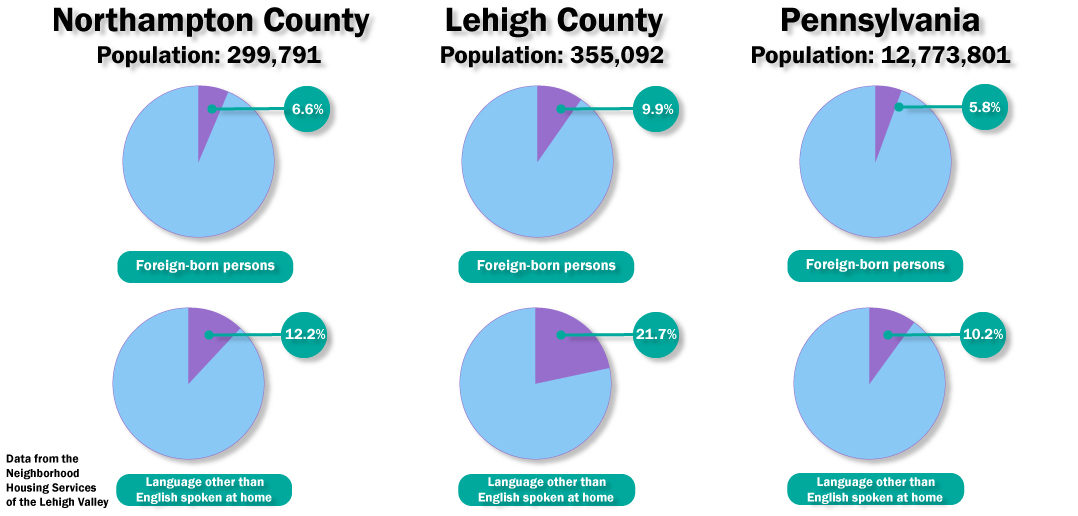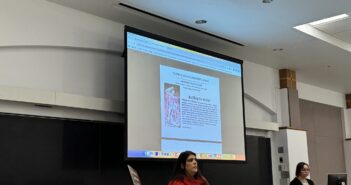The day after Election Day was anything but business as usual for Raymond Lahoud.
Lahoud, an immigration lawyer in the Lehigh Valley, said his firm received about 300 calls the day after Donald Trump became the president-elect of the United States. An average day is usually far less, he said, and the influx of clients has steadily continued over the past month.
“They were completely concerned about what could happen,” Lahoud said. “There’s a lot of uncertainty right now.”
Given the significant population of immigrants in the Lehigh Valley, including those who may not be documented, Trump’s election has resulted in fear and uncertainty for those who do not know if he will follow through with his proposed policies.
Throughout Trump’s presidential campaign, he used intimidating rhetoric and made promises to deport immigrants from the country, including his infamous plan to “build a wall” to stop further individuals from entering from Mexico.
Trump also said he will repeal many of President Barack Obama’s executive orders, one of which may include DACA, or the Deferred Action for Childhood Arrivals policy.
According to U.S. Citizenship and Immigration Services, this policy allows certain undocumented immigrants who entered the country as minors to receive a renewable two-year period of deferred action from deportation and eligibility for a work permit. It’s not a path to legal status, but it allows young immigrants to pursue an education or a job without the fear of being deported.
“It’s a mess,” Lahoud said. “It’s going to be a mess, because we don’t know what to expect. I think his whole campaign ran on the idea that he can have that ability to deport this many people.”
During the 2000s, migration — both domestic and foreign — accounted for more than 80 percent of Lehigh County’s total population growth of 37,407 and nearly 100 percent of the 30,669 population growth in Northampton County, according to a population report from the Lehigh Valley Planning Commission.
Chiara Minestrelli, a visiting scholar at Lehigh University in Africana studies and global studies, said she likes to remind her students that Bethlehem benefited from migrant labor at the steel factories in the early 20th century.
“It’s quite interesting that when migrants and migrant labor is useful, no one says anything about it,” she said.
Minestrelli, who was born in Italy and lived in Australia for many years, said Trump’s policies could cause a series of problems because, like many other countries, the United States’ economy relies on immigrant labor.
The estimated 300,000-person population in Northampton County is comprised of 6.6 percent foreign-born persons and 12.2 percent who speak a language other than English at home, according to statistics from the Neighborhood Housing Services of the Lehigh Valley.
These numbers are even higher in Lehigh County, which has 355,000 inhabitants — 9.9 percent foreign-born persons and 21.7 percent who speak a language other than English at home. All of these numbers are several percentage points higher than the state averages.
Matias Demichelis immigrated to the United States from Argentina with his family in 2002. The 20-year-old Bethlehem resident benefited from DACA after previously being undocumented for many years.
He was able to get legal status, the first person in his family to do so. He graduated from Freedom High School in 2014. Now, he and his family are on the path to permanent residency after 14 years in the U.S.
“I would assume it’s going to be really, really hard for a lot of those people who are still undocumented today to go through their legal process the way my family did,” he said.
[parallax-scroll id=”39375″]Demichelis said the atmosphere after Trump’s election has been tense because of the uncertainty that comes with his administration. He said it was a “lose-lose for immigrants” no matter which candidate won. Even though his family is unable to vote, he said they did not support either main party presidential candidate.
Charlie Dent, who is the U.S. Representative for Pennsylvania’s 15th congressional district, is a Republican but was largely outspoken during the election against Trump and said he would not vote for him. He voted for Evan McMullin, an Independent.
Dent said he believes if individuals cannot come into the country legally, many of them will still find their way into the country illegally. He said deporting the estimated 12 million illegal immigrants in the country is not a viable option and that reform is necessary. Lahoud said he thinks this number is closer to 20-30 million undocumented individuals or individuals who have overstayed their visas.
“We have to deal responsibly with children who came to this country, no fault of their own, and know no other place,” Dent said. “We know they are not going to be deported and that we’re going to have to deal with them in a responsible and humane manner.”
If Trump stays true to his word, the lives of immigrants may be impacted on his first day. But with a little more than a month left until he officially takes office, all anyone can do is wait and guess at what may happen. The same word hangs on many people’s lips — uncertainty.
“I do believe that if there will be follow-up to what is promised and what he says then things would be worse, but he is a very unpredictable man,” Minestrelli said. “We don’t really know what to expect from him.”






Comment policy
Comments posted to The Brown and White website are reviewed by a moderator before being approved. Incendiary speech or harassing language, including comments targeted at individuals, may be deemed unacceptable and not published. Spam and other soliciting will also be declined.
The Brown and White also reserves the right to not publish entirely anonymous comments.